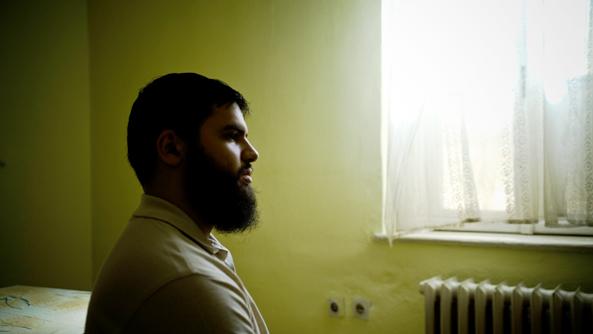"When a handful of Muslims decide to carry out a terrorist attack, it harms me too," Cem says. Since 11 September 2001, the Turkishborn protagonist of "The Accidental Terrorist" has been eyed as a potential terrorist.
Among those who make life hard for Cem is Abdulkadir Cesur, a young Danish Muslim convicted of conspiracy to commit an act of terrorism. Cem's curiosity is piqued when he finds out that Abdulkadir is of the same age and background as himself. Why did Abdulkadir become a fanatic? And how did he end up in a Bosnian prison?
"The Accidental Terrorist" follows Cem as he investigates the terrorconvicted Danish national. Cem talks with a former classmate of Abdulkadir, with his sister and his contact in Bosnia. Finally, as the first person ever, Cem is allowed to interview Abdulkadir on camera in his Sarajevo prison.
Top Snoop
"The Accidental Terrorist" is brought to us by two journalists: Nagieb Khaja, who is of Afghan extraction and has insight into Denmark's immigrant community.
Miki Mistrati, the person behind a much discussed Danish documentary about serious maltreatment at homes for people with developmental disabilities. Mistrati, moreover is head of the tabloid Ekstra-Bladet's so-called Snoop Group for investigative journalism. He was called in to work on "The Accidental Terrorist", when the filmmakers found themselves at a dead end.
"I'm used to persuading people," Mistrati laughs. "I'm not an artist. I'm a craftsman. And I immediately started digging into the case," he says. "Because I once did a programme that represented criminal immigrants in a different light than they are usually viewed in Denmark, I was able to gain the trust of several of the people involved."
However, the crew could take nothing for granted when they arrived in Sarajevo. "We didn't know if we would get even to see Abdulkadir. And if we hadn't, there wouldn't have been any film. A lot of people probably would not have made that gamble, but I like to gamble big," Mistrati says with a sly grin.
Wrong place, wrong time
Mistrati was the one who got the idea to mirror the convicted terrorist in law-abiding Cem, who grew up under similar circumstances, but ended up in an entirely different place in life. Identical conditions but different results. Mistrati and Khaja made a point of having a central character that young people could identify with.
"We adamantly did not want to have a panel of experts explaining the story. Kids want to experience things for themselves, and so we wanted to facilitate a high level of identification," Mistrati says. The reporter was delighted when his film took the Youth Jury Prize at the Odense Film Festival.
"The Accidental Terrorist" does not take a stand on Abdulkadir's guilt. Instead, it leaves you with the impression of a young man who made some unfortunate choices as a teenager and now has to live with the consequences of them for the rest of his life.
"Abdulkadir was struggling with his identity in his teenage years and dropped out. He joined a different community and now has to live with the consequences of travelling in the circles he did," Mistrati says. Abdulkadir professes his innocence.
Mistrati, who is currently working on a TV documentary investigating Abdulkadir's trial, found no conclusive proof of Abdulkadir's guilt. Hence the film's provocative title.
"I think he ended up where he did by accident. He was simply in the wrong place at the wrong time. Which is exactly what he claims," Mistrati says. In Abdulkadir, Mistrati sees a universal story of a young person groping towards some sense of belonging.
"Abdulkadir experienced a religious awakening when he was young, but so do a lot of other kids. Some kids become bikers, others become hip-hoppers like myself," Mistrati says. "Cem and Abdulkadir could easily have ended up in each other's shoes."
